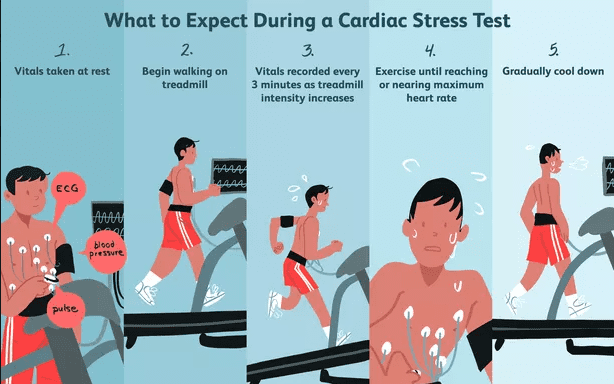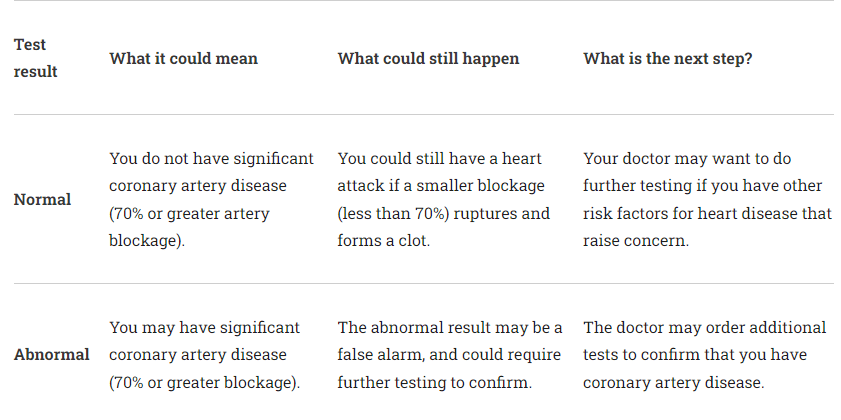What Does A Stress Test Show?
First of all, there is a big confusion between stress level text (which measures whether your stress level is too high) and stress test, which is also called an exercise stress test or a cardiac stress test or a treadmill test (which shows how your heart works during physical activity.) In this article, we will concentrate on the ❤️second type – cardiac stress test, which shows how your heart works during physical activity.
If you want to read more about the stress level test of use our free self-assessment – please follow this link below.
What Is A Stress Test?
In a stress test, you walk on a treadmill that makes your heart work progressively harder. An electrocardiogram (ECG) monitors your heart’s electrical rhythms. The doctor also measures your blood pressure and monitors whether you have symptoms like chest discomfort or fatigue. Abnormalities in blood pressure, heart rate, or ECG or worsening physical symptoms could point to coronary artery disease (CAD): fatty deposits (plaques) that reduce the flow of oxygen-rich blood to the heart muscle.
A stress test usually involves walking on a treadmill or riding a stationary bike while your heart rhythm, blood pressure, and breathing are monitored. Or you’ll receive a drug that mimics the effects of exercise.
Your doctor may recommend a stress test if you have signs or symptoms of coronary artery disease or an abnormal heart rhythm (arrhythmia).

Types of Stress Tests
Stress tests come in several varieties:
- Exercise versions: You’ll get on a treadmill or stationary bicycle.
- Chemical stress test: A special type of medication is given to “mimic a high-flow state to the heart. Chemical stress tests are given to those who cannot exercise because of a health reason.
- Nuclear stress test: This involves an injection of radioactive dye and an imaging machine that shows pictures of blood flow to your heart both at rest and after exercise.
What Does A Stress Test Show?
For men with symptoms like chest pain with activity or unexplained shortness of breath, an abnormal stress test points to a higher risk of CAD. But it’s more worrisome in a man who also has risk factors like older age, being overweight, or high cholesterol. “This points strongly to coronary artery disease.” Dr. Bhatt says. Confirming it could require further testing.
If you have symptoms and the test result looks normal, the risk of CAD is lower. “That person is less likely to have significant coronary artery disease,” Dr. Bhatt says. Even so, the doctor might still want to do more tests.
But it’s important to understand that a “normal” stress test can’t rule out the chance that a plaque will later rupture and block an artery—the proverbial tale of the man who passes a stress test with flying colors and then has a heart attack a week later. Stress testing detects arteries that are severely narrowed (70% or more). This is what causes symptoms. Heart attacks often result from lesser blockages that rupture and form clots.
When To Get A Stress Test?
The U.S. Preventive Services Task Force, an independent panel that makes recommendations to doctors, urges physicians not to routinely offer exercise stress testing to people without symptoms or strong risk factors for CAD. Physician groups like the American College of Cardiology support this recommendation.
The final decision, though, falls on you and a doctor who knows your health profile. “The guidelines leave a lot to physician judgment because we’re sometimes in a gray zone where we don’t really know what’s the ‘right’ thing to do for everyone,” Dr. Bhatt says.
Although the tide has turned against exercise stress testing of otherwise healthy men concerned about their heart risk, guidelines say that a stress test could be “considered” in a man who is older and relatively inactive but embarking on a vigorous new exercise program. “In that case, I would recommend a stress test,” Dr. Bhatt says.
Stress Test Results
An exercise stress test is designed to find out if one or more of the coronary arteries feeding the heart contain fatty deposits (plaques) that block a blood vessel 70% or more. Additional testing is often required to confirm the test result.

Nuclear Stress Test
Depending on the results, the doctor may recommend a nuclear stress test as a next step. Also known as a nuclear heart test or radionuclide scan, this can give a more detailed and accurate assessment of the heart.
The process is similar to that of the exercise stress test, but the doctor will inject a tracer dye into the arm to highlight the heart and blood flow on an image. The dye will also show any areas of the heart where blood is not flowing. This can suggest a blockage.
As with the exercise test, if a person cannot exercise, the doctor may use medication instead.
The person will then undergo an imaging test that involves a small amount of radiation, such as a single-photon emission computer tomography or cardiac PET test.
The doctor will take two sets of images, each covering 15–30 minutes. They will take the first just after the person has exercised and the second when their body is at rest, either later that day or the next day. They may also take “at rest” images before the person exercises.
In this way, the doctor can compare how the heart looks and functions normally and while under stress.


Lifescape Recovery Mental Health is a top-rated mental health and addiction treatment facility in Los Angeles, California. We create a safe space for patients to explore their mental health goals and needs. We offer a free, confidential consultation to any new clients and provide a number of different therapies to treat a wide spectrum of mental health struggles such as depression, anxiety, eating disorders, and substance use disorders. Our IOP and PHP facility is fully accredited. We are one of the highest-rated centers for mental health treatment in Los Angeles, California, which provides both in-person and online therapy. Our patients express endless gratitude and appreciation for the staff and the services and recommend Lifescape Recovery for their friends, colleagues, and community. There has never been a more important time to address mental health needs! Contact us today!
Published: March 01, 2022
Last Updated: February 15, 2022

Published: January 26, 2026
OCD vs. Autism: Understanding the Differences
Obsessive-compulsive disorder (OCD) and autism spectrum disorder (ASD) are often confused with one another. Both can involve repetitive behaviors, rigid routines, sensory sensitivities, and distress when things feel “off.” From the outside, the overlap can look striking. But in clinical treatment, the why behind those behaviors matters just as much as the behaviors themselves. At […]
Read more
Published: January 15, 2026
Obsessive-Compulsive Personality Disorder (OCPD)
People living with Obsessive-Compulsive Personality Disorder or OCPD often don’t see themselves as struggling with a mental health condition. They see themselves as responsible. Disciplined. Reliable. The person who holds everything together when others fall apart. But beneath that structure, many feel chronically tense, emotionally restricted, and exhausted by the pressure to do everything “the […]
Read more
Published: December 15, 2025
Why Mental Health & Addiction Spike During the Holiday Season?
The holiday season is often described as a time of joy, connection, and celebration. Yet for many individuals, it is also a period marked by increased emotional distress, worsening mental health symptoms, and a higher risk of substance use and relapse. Research consistently shows that rates of anxiety, depression, and addictive behaviors rise during late […]
Read more
